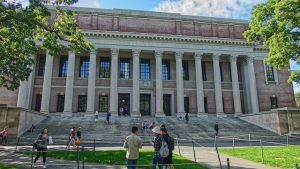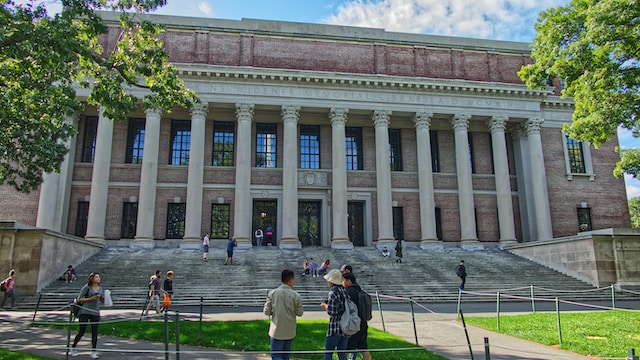Harvard University, the oldest and arguably the most prestigious Ivy League institution, stands tall as a symbol of academic excellence and accomplishment. Situated in Cambridge, Massachusetts, Harvard has been shaping minds and molding leaders for over three centuries.
Harvard’s Legacy of Excellence
Harvard’s legacy is unparalleled. Established in 1636, it has a rich history of producing leaders in various fields, including politics, business, science, and the arts. The university’s commitment to pushing the boundaries of knowledge and fostering critical thinking has made it a beacon of higher education globally.
What Sets Harvard Apart?
Harvard’s reputation is built on several key pillars:
- Academic Rigor: Harvard is known for its challenging academic programs. The university’s commitment to academic excellence ensures that students are pushed to their intellectual limits, fostering a culture of innovation and critical thinking.
- Distinguished Faculty: The faculty at Harvard consists of some of the brightest minds in the world. Students have the opportunity to learn from and engage with professors who are leaders in their respective fields, contributing to a vibrant academic environment.
- Global Alumni Network: Harvard boasts a vast and influential alumni network. Graduates of Harvard, known as Harvardians, have made significant contributions to society, making their mark in various professions and industries.

How to Get into Harvard
Gaining admission to Harvard is a highly competitive process, but it is not impossible. Here are some key steps to increase your chances:
- Academic Excellence: Harvard looks for students who have excelled academically. Maintain a high GPA and take challenging courses, showcasing your intellectual curiosity.
- Standardized Tests: Perform well on standardized tests such as the SAT or ACT. These scores are an essential part of the admissions process.
- Extracurricular Activities: Harvard values well-rounded individuals. Participate in extracurricular activities that showcase your passions and highlight your leadership skills.
- Letters of Recommendation: Strong letters of recommendation can make a difference. Choose recommenders who know you well and can speak to your character and accomplishments.
- Personal Essay: The personal essay is your chance to showcase your personality and unique perspective. Use it to tell your story and explain why you are a good fit for Harvard.
How to Get into Harvard from Australia
Getting into Harvard from Australia requires careful planning and dedication. Here are some tips for Australian students aspiring to attend Harvard:
- Research Requirements: Understand the specific admission requirements for international students. This includes language proficiency tests like the TOEFL or IELTS.
- Seek Guidance: Reach out to teachers, counselors, or alumni who can provide guidance on the application process. Understanding the nuances of the application can be beneficial.
- Highlight Unique Perspectives: Emphasize how your Australian background and experiences bring a unique perspective to the Harvard community. Harvard values diversity, and your international background can be an asset.
- Financial Aid: Investigate financial aid options for international students. Harvard is committed to providing need-based financial aid, and there are resources available to help offset the costs of attending.
Studying in America: The Harvard Experience
Studying at Harvard is not just about academic pursuits; it’s an immersive experience that goes beyond the classroom:
- Campus Culture: Harvard’s campus is a vibrant community where students from diverse backgrounds come together to learn and grow. The university organizes various events, clubs, and activities that contribute to a lively campus culture.
- Global Perspectives: Harvard attracts students from around the world, creating a melting pot of cultures and ideas. Engaging with peers from different backgrounds broadens your worldview and enhances the overall learning experience.
- Research Opportunities: Harvard provides extensive opportunities for research and innovation. Whether you are interested in science, humanities, or social sciences, you’ll find resources and mentorship to pursue your academic passions.
FAQ about Harvard University
Q: What is the acceptance rate at Harvard?
A: The acceptance rate at Harvard is extremely low, typically hovering around 4-5%. The competitive nature of the admissions process underscores the need for a well-rounded and exceptional application.
Q: Does Harvard provide financial aid to international students?
A: Yes, Harvard is committed to meeting the demonstrated financial need of admitted students, including international students. The financial aid process is need-based, and Harvard ensures that financial barriers do not prevent qualified students from attending.
Q: Are there scholarships available for international students?
A: While Harvard does not offer merit-based scholarships, the university is dedicated to providing need-based financial aid to all admitted students. This commitment reflects Harvard’s goal of fostering a diverse and inclusive community.
Q: What makes a successful Harvard application?
A: A successful Harvard application demonstrates academic excellence, strong standardized test scores, engagement in extracurricular activities, compelling letters of recommendation, and a well-crafted personal essay that showcases your unique personality and perspective.
Q: How can international students adapt to life at Harvard?
A: Harvard’s international community offers various resources and support systems to help students adapt. From cultural organizations to mentorship programs, there are numerous avenues for international students to connect with peers and make the most of their Harvard experience.
In summary, Harvard University, the pinnacle of prestige in the Ivy League, offers a transformative educational experience that goes beyond academics. While gaining admission is challenging, the rewards are immense, providing students with the knowledge, skills, and network to make a lasting impact on the world.



